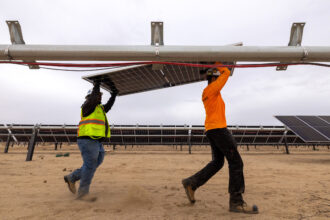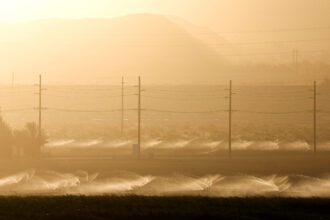Laura Beth Resnick grows flowers on her farm in Harford County, Maryland, where winter temperatures mean her greenhouses consume a lot of electricity. So, last year, she applied for funding through a government program that helps small businesses, like her Butterbee Farm, install energy-saving technologies.
“The greenhouses are important because we grow cut flowers, and all of the good holidays for cut flowers are in the winter, like Valentine’s Day and Easter,” Resnick said. “So having these greenhouses allows us to really provide flowers for our customers when they really need them. We learned that if we put solar panels on our barn, we would save about $5,000 a year.”
Resnick found out last summer that her application was successful: The U.S. Department of Agriculture (USDA) awarded her $36,000 to install the panels, which she promptly did. But when Resnick recently requested the promised funds, the agency issued a notice saying her request was being rejected. Now she owes $36,000 to the solar company.
“We would not have entered into this contract if we thought that the funds wouldn’t be provided,” Resnick said. “We need our contract honored by the government so that we’re not deeply in debt.”
Now Resnick, five other farmers and three nonprofit community organizations are suing President Donald Trump and the USDA to get their money.
Butterbee Farm is among thousands of recipients of funding from the Rural Energy for America Program (REAP), which was established in 2008 and has since distributed tens of millions of dollars to help farmers install renewable energy systems or energy efficiency projects. The program is funded through the Farm Bill, which directs $50 million a year toward these projects. But in 2022, with the passage of the Biden administration’s signature climate law, the Inflation Reduction Act (IRA), the program got a major boost of an additional $820 million through 2031.
On Trump’s first day in office, he signed an executive order that immediately froze IRA funds, including those promised to Resnick and her co-plaintiffs, while the administration conducts an ongoing review.
On Thursday, the legal advocacy organization Earthjustice filed a lawsuit in the U.S. District Court for the District of Columbia on behalf of Butterbee Farm and its co-plaintiffs, seeking a court order to force the administration to release the funds.
“This administration is unlawfully withholding these funds in violation of the Constitution and the Administrative Procedures Act,” said Hana Vizcarra, an Earthjustice senior attorney. “By refusing to disperse the funds that Congress allocated to specific grant programs, they’re violating the separation of power and the Take Care Clause. These are arbitrary and capricious actions taken without a reasoned explanation.
“Small businesses and community groups trusted the government to uphold its end of the agreements,” Vizcarra added, “and we’re not seeing that happen now.”
Thursday’s lawsuit is not the first legal attempt to restore IRA funding. In January, a coalition of 23 states and the District of Columbia sued Trump and a dozen government agencies and offices, seeking to unfreeze promised dollars. Earlier this month, a federal judge ruled that the executive branch didn’t have the power to stop funding approved by Congress and issued a preliminary injunction blocking the agencies from freezing the funds.
The USDA was not among the agencies named in that lawsuit.
Thursday’s lawsuit extends beyond REAP to other USDA programs, including the National Resources Conservation Services’ Technical Assistance Program and the U.S. Forest Service’s Urban and Community Forestry Program.
“Small businesses and community groups trusted the government to uphold its end of the agreements, and we’re not seeing that happen now.”
— Hana Vizcarra, Earthjustice
One of the co-plaintiffs, an environmental group called Faith in Place, was awarded $1.9 million through the forestry program to help support 50 faith-based and community organizations in the upper Midwest plant trees to lower extreme urban heat.
“We spent months carefully planning our tree canopy and workforce community grant to ensure that critical funding reached the right places,” said Rev. Brian Sauder, the group’s president. “We hired staff, we built infrastructure and we followed every federal requirement, fully expecting the government to uphold its commitment, just as we did ours. Instead, this administration is turning its back on our most vulnerable communities and putting the very organizations that make federal programs work in jeopardy.”
The USDA did not immediately return a request for comment Thursday.
Mike Lavender, policy director of the National Sustainable Agriculture Coalition, noted that the REAP program has been especially popular with farmers, regardless of political affiliation.
“There’s a difference between a new administration coming in and having different policy priorities—that’s how democracy should work,” Lavender said. “But here there are signed legal contracts that are not being honored. A farmer is spending $30,000 out of pocket and they’re being told it’s under review. This is a fundamental question about contract law.”
About This Story
Perhaps you noticed: This story, like all the news we publish, is free to read. That’s because Inside Climate News is a 501c3 nonprofit organization. We do not charge a subscription fee, lock our news behind a paywall, or clutter our website with ads. We make our news on climate and the environment freely available to you and anyone who wants it.
That’s not all. We also share our news for free with scores of other media organizations around the country. Many of them can’t afford to do environmental journalism of their own. We’ve built bureaus from coast to coast to report local stories, collaborate with local newsrooms and co-publish articles so that this vital work is shared as widely as possible.
Two of us launched ICN in 2007. Six years later we earned a Pulitzer Prize for National Reporting, and now we run the oldest and largest dedicated climate newsroom in the nation. We tell the story in all its complexity. We hold polluters accountable. We expose environmental injustice. We debunk misinformation. We scrutinize solutions and inspire action.
Donations from readers like you fund every aspect of what we do. If you don’t already, will you support our ongoing work, our reporting on the biggest crisis facing our planet, and help us reach even more readers in more places?
Please take a moment to make a tax-deductible donation. Every one of them makes a difference.
Thank you,













